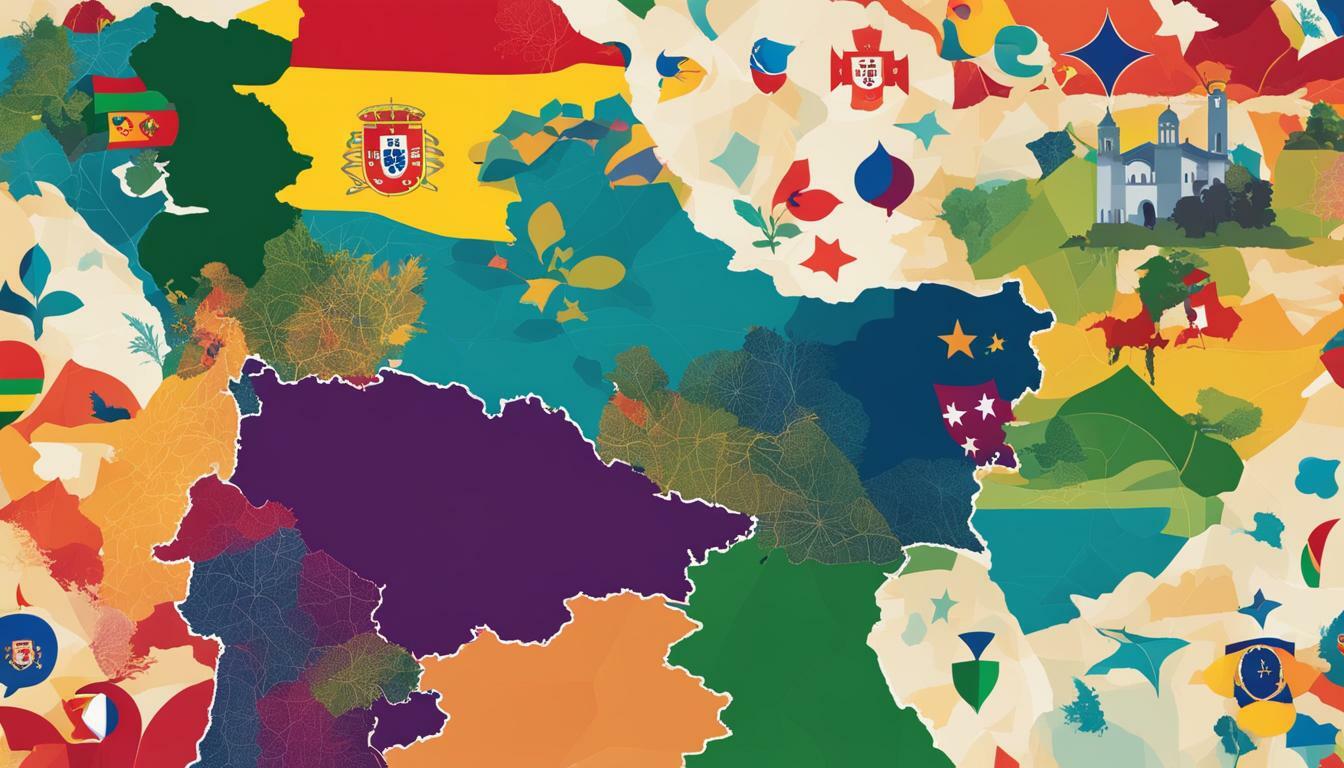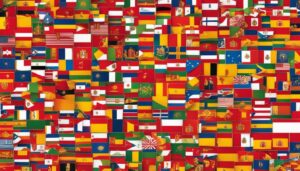Portugal is a captivating country with a rich linguistic heritage. The official language spoken here is Portuguese. It is the national language of Portugal and is also spoken in other countries such as Angola, Brazil, Mozambique, and Macau. Although Portuguese and Spanish share some similarities in vocabulary, they are distinct languages. When traveling in Portugal, learning basic Portuguese phrases can be helpful, although many locals also have some knowledge of English. The Portuguese language has unique characteristics, including nasal sounds and closed lip pronunciation. It has also been influenced by Arabic due to historical reasons. Learning Portuguese can open opportunities for obtaining citizenship and a European passport.
Key Takeaways:
- Portuguese is the official language of Portugal.
- Portuguese is also spoken in other countries, including Angola, Brazil, Mozambique, and Macau.
- Learning basic Portuguese phrases can enhance the travel experience in Portugal.
- The Portuguese language has unique characteristics, including nasal sounds and closed lip pronunciation.
- Portuguese has been influenced by Arabic due to historical reasons.
The Portuguese Language
The Portuguese language is the national language of Portugal and is an integral part of the country’s identity. It is also spoken in other countries such as Angola, Brazil, Mozambique, and Macau, making it one of the most widely spoken languages in the world.
Portuguese is a distinct language from Spanish, although they share similarities in vocabulary. Learning basic Portuguese phrases can be incredibly helpful when traveling in Portugal, allowing you to better communicate with the locals and immerse yourself in the culture.
One notable aspect of the Portuguese language is its pronunciation, which includes nasal sounds and closed lips. This unique phonetic characteristic gives the language its melodious and vibrant quality.
“Learning Portuguese can open up a world of opportunities,” says Ana Silva, a Portuguese language expert. “Not only will it enhance your travel experience in Portugal, but it can also lead to obtaining citizenship and a European passport, providing you with the ability to live and work in any EU country.”
Due to historical reasons, the Portuguese language has been influenced by Arabic. This influence can be seen in the vocabulary and certain pronunciation patterns. For example, words like “açúcar” (sugar) and “azeite” (olive oil) have their roots in Arabic, reflecting the cultural exchange that took place many centuries ago.
In addition to Portuguese, English is also widely spoken in Portugal, especially in urban areas and tourist destinations. Many locals have some knowledge of English, making it easier for travelers to communicate, especially when it comes to basic needs and directions.
The Importance of Learning Portuguese
While it is not necessary to be fluent in Portuguese for a visit to Portugal, taking the time to learn some basic phrases can greatly enhance your travel experience. It allows you to connect with locals on a deeper level, gain valuable cultural insights, and navigate the country more effectively.
| Reasons to Learn Portuguese | Benefits |
|---|---|
| 1. Enhanced Travel Experience | Understanding the local language helps you engage with locals, try authentic Portuguese cuisine, and discover hidden gems off the beaten path. |
| 2. Cultural Appreciation | Learning Portuguese shows respect for the local culture and allows you to fully appreciate the rich history and traditions of Portugal. |
| 3. Language Immersion | Immersing yourself in the local language helps you become more attuned to the nuances of conversation and language use. |
| 4. Professional Opportunities | Proficiency in Portuguese can open doors to business and career opportunities, particularly for those interested in the international market. |
Whether you are planning a trip to Portugal or seeking personal and professional growth, learning Portuguese is a rewarding endeavor that will broaden your horizons and deepen your connection to this beautiful language and culture.
Dialects and Variations
While Portuguese is the official language of Portugal, there are also various regional dialects and linguistic variations across the country. These regional differences in pronunciation, vocabulary, and grammar reflect the rich cultural diversity found within Portugal.
One example of a regional dialect is Mirandese, spoken in the northeastern region of Miranda do Douro. Mirandese is recognized as a co-official language alongside Portuguese and is protected by law. This dialect has its roots in the Astur-Leonese language and is spoken by a small but proud community.
In addition to Mirandese, there are other regional variations that can be found throughout Portugal. The northern regions, for instance, have a distinct accent and vocabulary compared to the southern regions. The islands of Azores and Madeira also have their own unique dialects, influenced by their isolation and historical factors.
Table: Regional Dialects in Portugal
| Region | Dialect |
|---|---|
| Minho | Minhoto |
| Trás-os-Montes | Transmontano |
| Beira | Beirão |
| Alentejo | Alentejano |
| Algarve | Algarvio |
| Azores | Azorean |
| Madeira | Madeiran |
These dialects and variations contribute to the linguistic richness of Portugal and showcase the country’s cultural and historical diversity. While the majority of Portuguese speakers understand and can communicate in standard Portuguese, being aware of these regional differences can enhance your understanding and appreciation of the local culture when exploring different parts of Portugal.
Influence of Arabic and other languages
The Portuguese language has been influenced by Arabic due to historical reasons, resulting in unique linguistic elements. This influence can be seen in the vocabulary, pronunciation, and even grammar of the language. For example, words like “azeite” (olive oil) and “alface” (lettuce) have Arabic origins. These linguistic borrowings add depth and richness to the Portuguese language, reflecting the country’s diverse cultural heritage.
In addition to Arabic, other languages have also played a role in shaping the Portuguese language. Latin, as the precursor to Portuguese, provided the foundation for its grammar and structure. The language has also incorporated words from different European languages, such as French and English, through cultural exchange and globalization.
Table: Examples of Arabic Loanwords in Portuguese
| Portuguese Word | Arabic Origin |
|---|---|
| azeite | az-zayt |
| alface | al-khass |
| azeitona | az-zaytuna |
As an aspiring Portuguese language learner, understanding the influence of Arabic and other languages on Portuguese can provide a deeper appreciation for its complexity and evolution. It is fascinating to observe how different cultures from across the globe have shaped the linguistic landscape of Portugal.
Ultimately, learning Portuguese not only allows for better communication with the Portuguese-speaking world but also opens doors to cultural understanding and the potential to obtain Portuguese citizenship and a European passport. So, whether you’re planning a trip to Portugal or looking to expand your language skills, exploring the influence of Arabic and other languages on Portuguese can be a rewarding journey.
Language in Daily Life and Travel
While it can be helpful to learn basic Portuguese phrases when traveling in Portugal, many locals also have some knowledge of English, particularly in tourist-centric areas. If you find yourself in need of assistance or directions, chances are you’ll be able to communicate effectively in English. However, venturing beyond the main tourist spots and immersing yourself in the local culture can be enhanced by embracing the Portuguese language.
Learning a few key phrases can go a long way in connecting with the locals and experiencing the true essence of Portugal. From greetings like “Bom dia” (Good morning) and “Boa noite” (Good evening) to expressing gratitude with “Obrigado/a” (Thank you), showing an effort to communicate in Portuguese can earn you smiles and appreciation.
Another interesting aspect of language in Portugal is the strong influence of Arabic. Due to its historical connection with Arab civilization, the Portuguese language has borrowed several words and phrases from Arabic. For example, words like “azeite” (olive oil) and “açúcar” (sugar) have Arabic origins, adding a unique flavor to the language.
If you’re planning an extended stay in Portugal or even considering citizenship, learning Portuguese can open up a world of opportunities. Not only will it allow you to fully integrate into Portuguese society, but it can also lead to obtaining citizenship and a European passport. Fluency in Portuguese can open doors to new job prospects, cultural experiences, and deeper connections with the local community.
Table: Useful Portuguese Phrases for Travelers
| English | Portuguese |
|---|---|
| Hello | Olá |
| Excuse me | Com licença |
| Where is…? | Onde fica…? |
| How much does it cost? | Quanto custa? |
| Can you help me? | Você pode me ajudar? |
| Goodbye | Adeus |
Conclusion
Portuguese is the language of Portugal, representing its cultural heritage and providing a gateway to exploring the country’s rich history and traditions. As the official language, Portuguese is spoken by the majority of the population in Portugal and is the key to effective communication during your visit to this beautiful country.
While it is not necessary to be fluent in Portuguese, learning some basic phrases can greatly enhance your travel experience. Locals appreciate the effort and it opens doors to a deeper cultural immersion, allowing you to connect with the people and their traditions on a more meaningful level.
Portuguese pronunciation has its own unique characteristics, with nasal sounds and a distinct rhythm. Remember to speak with closed lips and embrace the melodic nature of the language. Don’t be afraid to practice and engage with the locals – they will be delighted to help and guide you.
Furthermore, the Portuguese language is influenced by Arabic, a result of the historical connections between Portugal and the Arab world. This influence can be seen in the vocabulary and pronunciation of certain words, adding an additional layer of depth to the language.
Moreover, learning Portuguese can open up opportunities beyond just your travels. Obtaining Portuguese citizenship can lead to a European passport, which provides numerous benefits and privileges. So, whether you are immersing yourself in the language for travel or considering a long-term commitment, learning Portuguese is a valuable investment.
FAQ
What language do they speak in Portugal?
The official language spoken in Portugal is Portuguese.
Is Portuguese the same as Spanish?
No, Portuguese is a distinct language from Spanish, although they share similarities in vocabulary.
Where else is Portuguese spoken?
Portuguese is also spoken in other countries such as Angola, Brazil, Mozambique, and Macau.
Is it necessary to learn Portuguese when visiting Portugal?
While many locals in Portugal have some knowledge of English, learning basic Portuguese phrases can be helpful for traveling.
How do you pronounce Portuguese?
Portuguese pronunciation has nasal sounds and is spoken with closed lips.
Is the Portuguese language influenced by Arabic?
Yes, the Portuguese language has been influenced by Arabic due to historical reasons.
Can learning Portuguese open opportunities for obtaining citizenship and a European passport?
Yes, learning Portuguese can open opportunities for obtaining citizenship and a European passport.



